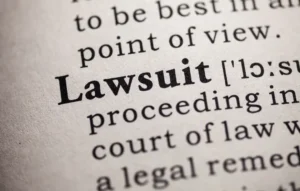
When you have been injured or when you are involved in a dispute about money, there can be a tendency to rush the decision to sue. It’s important to remember that the money you recover in a lawsuit comes at a cost, such as lawsuit filing fees, attorney’s fees, and the time and trouble it takes to go to court. Lawsuits are about more than money, though. They are about justice. That’s why it’s important to consider everything you might gain or lose by filing suit, including the opportunity to right a wrong.
Below are a few things to consider before you file a lawsuit against a company or person.
Suing on Principle
The purpose of civil lawsuits is to allow you to obtain justice for a wrong you suffered. When someone violates important principles such as honesty, carefulness or fairness and causes you a personal or financial injury, a lawsuit is one way to balance the scales of justice. You may be tempted to sue even if the goal of litigation is something other than money. If a person or company has wronged you, the “principle” of pursuing justice and righting this wrong may be your ultimate goal even if the lawsuit does not directly or immediately improve your financial condition.
When your primary motivator is the principle, rather than the money, you need to evaluate with your attorney whether the cost of litigation is worth it to you. In some cases, a strategic lawsuit can be used to send a message that you or your company will not tolerate certain types of misconduct. If there is a risk that others will harm you in the same way in the future, a lawsuit may be a sensible way to protect you or your company. But, litigation is expensive. As the proverb says, “You should count the cost before you build the house.” Make sure that filing suit over principle is something you can afford and that the time, expense, and aggravation are worth what you hope to gain.
Remember that there may be other ways you can address the problem. In many cases, your lawyer can negotiate a settlement with the other sides.
While the wrong you suffered may be deeply upsetting and you feel as though a lawsuit is the answer, you should consider the burden of a lawsuit on your personal life. Lawsuits are expensive in terms of time and dollars. Lawsuits can be emotionally draining as well. You may find that a lawsuit interferes with the time you have for your work, business, family, and social life. There will be paperwork to complete, court hearings to attend, and orders provided by the judge to follow. And, there may be a loss of privacy as the other party investigates your claims. But, the justice you receive may well be worth the cost. We can help you consider the pros and cons of filing a lawsuit.
Suing for Principal (“the money”)
In a civil lawsuit, you can recover money damages. In some cases you can get a court order enjoining the other party from acting in certain ways. Lawsuits are a tremendous tool for resolving disputes, but they are expensive. Before filing a lawsuit, it is important to have a frank discussion with your attorney about whether a lawsuit is likely to improve your financial condition or cost you more than you recover. You also will want to evaluate whether the defendant has the ability to pay any judgment you obtain. Fortunately, many cases settle before trial – well over 90% settle in the United States.
It is always important to balance cost and benefit and to consider the “principal” and the “principles” involved. This is one reason that we handle many lawsuits on a contingency fee basis. When you hire an attorney on a contingency fee, you only pay attorneys fees if your attorneys recover money for you. The attorneys charge a fee that is a percentage of the money they recover for you. Typically you will also be responsible for the case costs. Contingency fees can make it feasible for you to bring a lawsuit without risking your financial well-being.
In Conclusion…
Before rushing to file a lawsuit, it is important to consider all of the options for solving your legal problem. It may be possible to negotiate a mutually beneficial compromise directly with the other party. Another option is to hire a mediator. This neutral third party will help you and your opponent evaluate your goals and options in order to come up with a solution that works for everyone. You may also be able to submit your dispute to binding arbitration.
Our team at MSB Law will ensure you understand the financial and personal cost of all of your options. Our goal is to help you solve your legal issues in the manner that best fits your needs and your situation.
